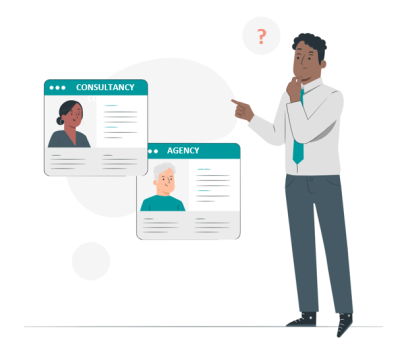Clinical Regulatory Affairs – Consultancies vs Agencies
What’s the difference and which is right for you?
Consultancies and agencies are all the same, right? Actually, no. There are quite big differences between the two, and some of them might be surprising. Having worked and gathered expertise on the client side, CLIN-r+ want to ensure that manufacturers can make informed decisions about who they work with, and why.
We know it can feel like a game of chance when choosing who to outsource important work to. So, we wanted to give you a head start by providing an overview of both options to assist in the process. Read on for a comparison of consultancies vs agencies below.

What are Agencies?
By definition, an agency is a business or organisation providing a particular service on behalf of another business, person, or group. Generally, agencies are involved in finding and recruiting expertise based on what you think your project needs. They may offer project managers who will co-ordinate the communication of a specific project and contract ad-hoc staff based on your resources stipulated in your project plan.
An agency can actually ‘specialise’ in virtually anything and is a catch-all way to describe a company that does business with another business. You’re probably very familiar with this term. However, an agency in clinical affairs or regulatory doesn’t necessarily have this expertise in-house. Quite often, they outsource to a third party (usually a consultancy) and act as ‘middlemen’ to get the job done. In many cases you are actually working with a recruitment agent focussed to find the expertise. In this case, it’s also worth considering that you’re paying extra for the privilege. Technically, you’re paying for both the agency and any party or parties that they need to involve.
What are Consultancies?
The definition of a consultancy is a professional practice that gives expert advice within a particular field and runs a full project service. Hence, they will take the burden of planning and delivering on a project.
A consultancy has a framework of how to execute projects such as workflows and templates to deliver milestones and get most of the expertise they have to give you a competed solution. Consultancies have greater reach to find ‘subject matter experts’ within a specific field medical field that need to provide specialised services into projects. Contracts are set-up on a project basis, and their services can range from short-term assessments or solutions to long-term, ongoing partnerships. The goal of a MedTech consultancies is to provide full solutions in validations, design, regulatory affairs, and clinical affairs to get the project done.
But can’t agencies just offer consultancy services?
In theory, yes. However, the practicalities of this can differ. Keep in mind that an agency can easily extend their services into a new specialist area where they have little/no experience. Their main function is ‘recruiting’. They may promise project co-ordination or management, but often actually get in the way of parties effectively collaborating.
This is because they lack the know-how and vocabulary which both the contracted staff and manufacturers must provide and explain. Communication and alignment are key problems as the agency (or ‘recruiter’) can struggle to get to grips with the Medical Device project needs. Plus, they will recruit people who may have never worked together before. This in itself can cause various issues known as FSNP in Six Sigma. The concept of Forming, Storming, Norming, and Performing (FSNP) describes the four stages of psychological development a team goes through as they work on a project. Teams move through each stage as they overcome challenges, learn to work together, and eventually focus on accomplishing a shared goal. Going through this process can result in lack of progress and loss of project time.
Agency operations and economics differ greatly from consultancies.
We’ve seen numerous agencies oversell strategic consulting, under deliver, and try to upsell tactical execution. This style of “full service, beginning to end support” sometimes converts the agency into a salesperson rather than an expert advisor or project coordinator.
However, consultancies have experts in specific areas of development, technology, research, strategy, documentation, etc. They will employ specialists such as clinicians, toxicologists, statisticians, medical writers and other subject matter experts (SME). It’s worth noting that they will have teams that have worked together before on similar projects. The consultancy will have tried and tested workflows everyone will be familiar with, saving billable time in the project. The consultancy usually works at a senior level and will help the clinical or regulatory affairs team transition the project plan when executing an agreed strategy.
So how do you compare them?
Clinical Regulatory Affairs Consultancies vs Agencies? They’re entities that both operate within the field of regulatory affairs in the healthcare and MedTech industries. They both also play essential roles in ensuring compliance with regulatory requirements. However, they differ in their structure, services, and how they engage with manufacturers. Here’s a comparison of the two.
Agencies | Consultancies | |
Structure | External entities which act as an umbrella company and engage with third party experts to offer individuals as contracted staff to manufacturers for projects. | Teams of seasoned professionals that have worked together on similar projects. Consultancy workflows and templates that have vetted success in delivering a service. |
Functions | Liaises with contractors on behalf of client. Will need to sign off various timesheets from them. They may offer project co-ordination support but expertise is limited. Will need to be debriefed about most aspects of the project due to limited understanding of requirements. | Provide expert guidance, strategic advice, and regulatory expertise to clients. Focus on managing and overseeing regulatory affairs activities. They are responsible for ensuring that all regulatory requirements are met, and they can interface directly with regulatory authorities. They provide strategies and solutions. |
Services | Focus is on recruiting suitable contractors for a MedTech project. This will be based on clients’ outline of roles for a project. Therefore, you will need to tell them what is required for the project in detail in order for them to fulfil this. This may include providing them with job descriptions. | Offer services such as strategy development, document preparation, submission support, and assistance with navigating complex regulatory processes. Their services encompass regulatory strategy development, submission of regulatory documents, and ensuring compliance with regulatory standards throughout the product development lifecycle. |
Involvement | Recruit and liaise with contractors on behalf of client to secure them to the project. Will need to find external experts to try and achieve compliance. | Directly involved in the regulatory processes and should have an understanding of the manufacturer’s regulatory needs. Consultants act as external experts to help clients achieve regulatory compliance. |
Staff | Agencies recruit professionals with expertise, including regulatory affairs specialists, project managers, and compliance experts (who may not be used to working together and have differing opinions or styles). Alternatively, they can use a third party recruitment agent. | Consultancies are staffed by regulatory experts, consultants and subject matter experts who have in-depth knowledge of clinical and regulatory requirements and best practices. These staff members have worked together and are familiar with standard workflows that the consultancy has for services. |
Who do I choose to work with?
The decision to choose between an external agency and a consultancy for your specific needs should be based on several factors, including the nature of your project, the level of expertise required, your budget, and your preferred working relationship.
Here are some considerations to help you make the choice.
Consider an External Agency if:
- You if have vacancies that will take time to fill.
- You have a quick project that can easily be completed by a contractor independently.
- There is a set project which you have the expertise, time to coach, access to resources (like literature databases, statistical software) and templates that a contractor needs to complete a well-defined task.
- You anticipate the need for scaling up or down as your project progresses. Agencies can recruit contractors as you define them in your project requirements.
Consider a Consultancy if:
- A full project solution is required.
- Your project requires highly specialised knowledge and specific advice. A consultancy will have in-house subject matter experts that can provide tailored insights and recommendations.
- You need strategic advice, recommendations, and guidance for decision-making. A consultancy can offer expert insights and help you formulate and execute strategies and ensure compliance.
- You have focused projects that require expertise, such as clinical development, clinical investigation or evaluation, or non-conformances. A consultancy can offer targeted services.
- Flexible and tailored services are needed for your specific project’s requirements and timelines.
- You have budget constraints. Consultancies can often be a more cost-effective choice, as you pay for the specific expertise and assistance you require.
- Your project is complex, extensive, or requires a large team with diverse skill sets. A consultancy provides the necessary resources and specialised personnel.
- When navigating complex regulatory environments, you need help to ensure adherence to standards.
- You require continuous support for long-term projects.
Ultimately, the choice between external agencies vs consultancies should be based on your unique needs and goals. Additionally, consider your budget, your time to coach someone (perhaps you want to hire a full-time contractor), timeline for completion, and preferences when making a decision.

Before making your choice:
It’s essential to thoroughly evaluate you project needs. If choosing an agency, it will be the same process as recruiting. For each contractor they provide, this means interviews and assessment of qualifications, experience, and references. Consultancies are best to choose if you have a problem or need a full project undertaking. They will take care of compiling the right team to deliver on your project’s requirements. It’s also worth remembering that some agencies promote themselves as consultancies, so it’s well worth doing your homework to understand exactly who you’re outsourcing to.
Clin-r+ recommendations
Whoever you choose, we recommend meeting with the potential service providers to discuss your project in detail and understand how they can best meet your needs. An NDA can be put in place for this, if needed.
At CLIN-r+ we’re a trusted Clinical Regulatory affairs partner (consultancy) to manufacturers of medical and in-vitro diagnostics devices manufacturers worldwide. We ensure our clients remain in compliance with regulatory standards. Our clinical, IVD, and technical documentation services provide audit and inspection readiness.
We will happily prepare a customised quotation based on the scope of work. Leave it up to us to create a project plan, define deliverables, timelines, and place suitable resources to deliver on your project. This way you’ll understand exactly where you need our expertise, project timelines and resource needs. CLIN-r+ has a wealth of experience to call upon. Get in touch!

